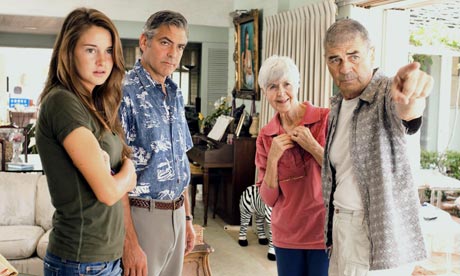 Matt King (George Clooney) is a lawyer living in Hawaii, a
descendant of the Aloha State’s
royal bloodline stemming from the union
in the 1840s between a missionary's businessman son and a native Polynesian
princess. In fact, Matt is the sole executor
of the family trust which owns a vast plot of land worth billions of dollars.
All the family members, various cousins scattered over the islands, have agreed
to cash in and now just need Matt to play his role and negotiate the sale. There
is some urgency, since in seven years a change in legislation means that the
sale will no longer be possible.
Matt King (George Clooney) is a lawyer living in Hawaii, a
descendant of the Aloha State’s
royal bloodline stemming from the union
in the 1840s between a missionary's businessman son and a native Polynesian
princess. In fact, Matt is the sole executor
of the family trust which owns a vast plot of land worth billions of dollars.
All the family members, various cousins scattered over the islands, have agreed
to cash in and now just need Matt to play his role and negotiate the sale. There
is some urgency, since in seven years a change in legislation means that the
sale will no longer be possible.
The film starts
with Matt having to cope with the fact that his wife, Elizabeth (Patricia Hastie), is
now in a coma following a water-skiing accident. Elizabeth has been enjoying
the Hawaiian life whilst Matt (who hasn't been on a surfboard for 15
years) has been busy earning the family crust. Matt
has been neglectful of his family and can barely control his two daughters: 17-year-old
Alexandra (Shailene Woodley) and 10-year-old Scottie (Amara Miller).
Matt has a strained relationship with both daughters, but Alexandra
reveals that Elizabeth has been unfaithful and in fact was about to ask for a
divorce when the accident happened. Elizabeth’s doctor then explains that she
will not recover.
This film by Alexander Payne is about how Matt copes
with this intense situation, his anger at his comatose wife, his frustration at
trying to rebuild his relationships with his daughters, and helping friends and
family to say their good-byes to Elizabeth. Her living will requires that he have
her support system switched off in these circumstances. There is truly convincing
acting from Shailene Woodley and Amara
Miller to compliment Clooney’s masterful portrayal of Matt and Alexandra’s tag
along boyfriend Sid (played by Nick Krause), who is both precocious and
insightful (as it turns out), provides some of the humour.
